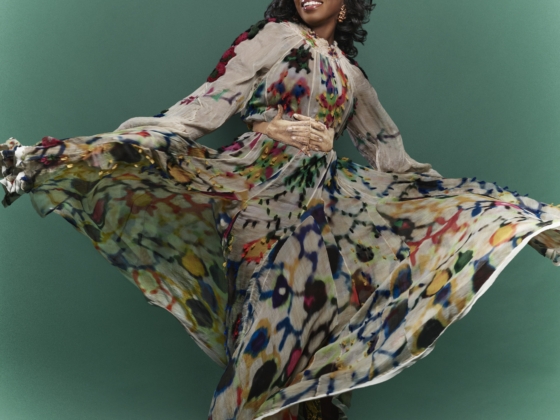With an astonishing 28 releases under his belt, London-based Max Cooper is on the verge of releasing his first full length LP, Human, and from what we have heard so far, it's set to be an absolute masterpiece. His take on electronic music is something to be marveled at. Each track takes the listener on a journey through what is truly capable when man and machine form a perfect relationship.
We caught up with the Belfast-born producer to see what makes him tick and get some insight into the making of the debut album, which you can stream here.
EARMILK: Hi Max. After so many successful single releases, why did you feel it was time to release a full length record?
Max Cooper: I'd wanted to release an album for a long time, a few years. I started working on this album about three years ago or something. I was just waiting for the right time, and for the right music to come together, because I didn't just want to do an album that was a collection of dance music or club releases. It was something I started working a few years ago but I wasn't really pushing. When I had some spare time, I was working on ideas and just letting it happen naturally, and it just took a long time for it to come together essentially.
EM: How did the process differ between creating a standalone track and a full body of work?
MC: There was an overarching concept for the album. It is essentially about the human condition, or humans in general, and I wanted each track to tell a story or talk about a concept which is common to all people. So that was an overarching principle which had to be applied to every track, whereas with a standalone track, it would just be one concept for that track, maybe just a functionally good club track.
For the album, it was about thinking about how it might fit into a bolder category, and how it might sit in a mix. The other thing was that I had to think about making some form of consistency, so I was applying that mix of electronics and strings and the type of production I was using was relatively consistent.
EM: You have quite a strong background in science, what influenced the switch from academia to music production?
MC: I was involved in music for a long time, since before I went to university. I started in '98 or '99, getting heavily involved in music. I was DJing all the way through university but when I started my PhD I started writing music as well. I spent a lot of time doing science and music in parallel, so it was really a matter of working as hard as I could on both of them and seeing which one paid off. I always thought that it would be science, but in the end, it was the music that took over. There came a time where I had to go full time with music and unfortunately science has fallen by the wayside.
EM: Do you think your scientific background has shaped the way you make music at all?
MC: Perhaps. Doing a PhD, essentially you have to take some topic and then direct your own research, work by yourself to get the forefront of this area of research, and try to figure out something new. You have to learn how to take on a new project and systematically work your way through until you're able to present something new. That self belief, or techniques of doing that, are very similar to how I approach music. I don't have any training in music or music production, it was a matter of self teaching. It's not an easy process, but the scientific side of things encouraged me that I could do it.
EM: The style of music you make is quite niche and contains complex rhythms, it is difficult to tell where the ideas begin. Where do you start when making a new track?
MC: Usually I start with an underlying chord progression for the melodic tracks. I think there is one atonal track on the album, which is just beats, which is the concept of the track. It's generally a case of starting with some sort of melodic feeling that can carry the concept, and then it's building rhythms and drums as well as finding the right samples and things that fit around the basic chord progression.
EM: In terms of your live sets, you have adopted some interesting delivery systems, such as 3D sound systems. Is this something you think we will see more from artists or was it something unique that you wanted to focus on for a brief time?
MC: The company name is 4D sound. It's something I am still working on, I have been there recently working on a weight system so that we can tour with it because the existing system weighs 20 tonnes or something, it's a nightmare to move it. There is a lightweight system, so hopefully we will be touring that later this year. I hope that system spreads and becomes more popular, it's an amazing listening experience and totally different from any club experience.
I guess there's a limit to how common it can become, because it requires a lot of specialist technology and expertise, you can't just turn up and play on it. So it won't spread to the mainstream, but hopefully it will spread to people who are looking for new sound experiences. In general, technology has taken over the music scene. It wasn't long ago that people were playing records, and these days, people are playing shows with a whole range of different technologies. So for sure, it's the trend, and it should be.
EM: How do you put together your live sets? Are you more inclined to build it up with more energetic tracks, or do you prefer to showcase your music the way you think it should be listened to?
MC: It depends on the gig. For the 4D show, it was very much a predefined thing in terms of the tracks I am going to play. For my club live shows, I set up totally differently, I have all my music that I've ever made in front of me and don't have a predefined set list of what I am going to play, it just depends on what is best for the audience and the event. There's so many factors to be taken into account and I need total flexibility to be able to play a different set every time.
EM: So what can we expect from the rest of the year? Any plans for future releases besides the album? Any live shows?
MC: Yeah, after the album there will be a remix package with a lot of my favorite artists remixing the album. After that, I am working on some new music. I will probably do some more club-related releases, and I also have some potential 4D sound system releases — which are essentially tracks I have composed specifically for the 4D sound system, using binaural microphones inside my ears to capture how the sounds interact with your head, so when you listen back on headphones you can get the surround sound experience.
It looks like Max Cooper has some pretty interesting things lined up for the near future, and with the release of Human on March 10th, it's an exciting time for fans. Stream a track from the album below, or preview it in full via Pitchfork Advance.
[soundcloud url="https://api.soundcloud.com/tracks/137033057" params="auto_play=false&hide_related=false&visual=true" width="100%" height="450" iframe="true" /]
Max Cooper
Seething
- 2014-03-10












